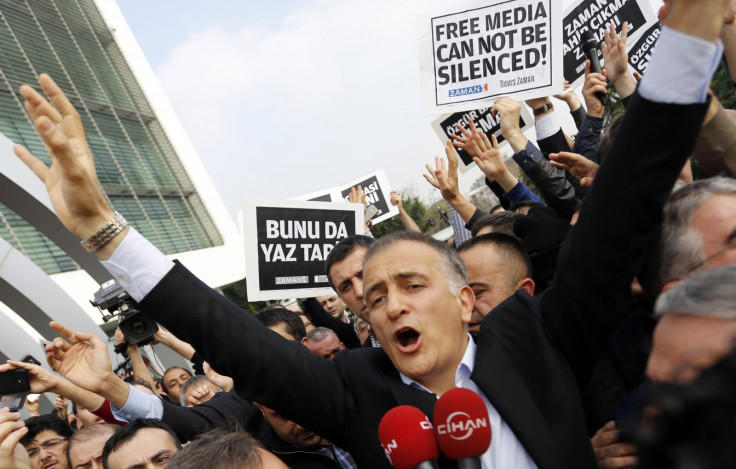Turkey media arrests: Escalation in bitter Erdogan-Gulen feud

The latest wave of arrests in Turkey represent a significant escalation in the war for power in the country. They include raids on a newspaper and TV station linked to Fethullah Gulen, an influential cleric in self-imposed exile in Pennsylvania, US,
Among those detained was the editor-in-chief of Turkey's largest daily newspaper, Ekram Dumanli of Zaman, who tweeted a picture of himself at his desk:
Officers back because of democratic reaction of my friends. I am at my place and wait.
#FreeMediaCannotbeSilenced pic.twitter.com/ANB7cMvChM
— Ekrem Dumanli (@DumanliEkrem) December 14, 2014Another target was the general manager of the Samanyolu Broadcasting group, Hidayet Karaca. He told reporters the operation was "a disgrace for Turkey".
"Sadly in 21st Century Turkey this is the treatment they dish out to a media group with tens of television and radio stations, internet media and magazines," he said on Zaman. The leader of Turkey's main opposition party, the secular Republican People's Party, called the raids "a coup".
The EU condemned the media crackdown as "incompatible with the freedom of media, which is a core principle of democracy". The US state department urged Turkey not to violate its "core values" and its own "democratic foundation".
The police operation, which ended up with the arrest of 23 people accused of forming an illegal armed terrorist organisation and trying to seize control of the state, came just two days after the President Recep Tayyip Erdogan vowed to "overthrow" what he called a "network of treason" with clear reference to the eponymous Gulen movement.
Also called Hizmet (service) the movement has a worldwide network of private schools, media outlets and charities. Exactly one year ago the 70-year-old preacher and his movement were accused of being behind a wave of high-profile arrests that shook the moderate-Islamist government of the then-prime minister Erdogan. Forty-seven businessmen and politicians, including the sons of three Cabinet ministers, were put in custody on corruption and bribery charges.
Erdogan accused Gulen of orchestrating the scandal against his inner circle in an attempted "judicial coup" and of building a "parallel state" with extensive influence in the Turkish police and judiciary. Reports that Gulen members infiltrated the secret services, law enforcement offices and the AK party itself have circled in Turkish media for some time.
The same accusations were repeated by Erdogan on Friday. He denounced Hizmet as a "parallel structure, which was talking about education, service and benevolence" while being involved in "dirty murders". He claimed that the parallel structure "never acted alone".
"Occasionally even terrorist organisations and their political parties have been carrying out work with this network of treason. But this nation will set its course by its own accord," Erdogan said.
Earlier in November, correspondents from Turkey's largest daily newspaper, Zaman, as well as Bugun, Samanyolu TV station and Cihan news agency said they have been barred from entering the presidential palace since Erdogan became the first president elected directly by the Turkish people.

Tensions between Gulen and Erdogan, a former ally, worsened over the past few years and exploded with the graft probe in December.
The former prime minister and current president sought to purge the judiciary and police of Gulen's influence and called for the cleric's extradition to Turkey.
The row extended to businesses linked to the preacher, in particular to Islamic lender Bank Asya whose shares dropped after state-owned firms and institutions withdrew huge deposits earlier this year.
Both Gulenists and Erdogan's AK party were long persecuted by the secularist generals that saw themselves as guardians of the secular state founded by Mustafa Kemal Ataturk, the father of modern Turkey.
When the moderate Islamist AKP took power in 2002, the Gulen movement provided indispensable support for Erdogan with its extensive influence in the media, police and judicial system.
After AKP swept to a second term five years later, pro-Gulen prosecutors cracked down on generals through the "Ergenekon trial" of hundreds of alleged coup plotters.
Gulenists seized the opportunity to take revenge on former rivals, including the military.
World-renowned journalists such as Ahmet Sik and Nedim Sener were searched and arrested in 2011 for their work critical of Gulen's network.
But the struggle for power and influence in Turkey turned the former friends against each other for the control of Turkish politics.
© Copyright IBTimes 2025. All rights reserved.




















